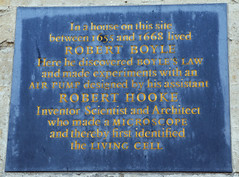Robert Boyle


Robert Boyle
(1627-1691)
Commemorated on 6 plaques
In a house on this site between 1655 and 1668 lived Robert Boyle. Here he discovered Boyle's Law and made experiments with an air pump designed by his assistant Robert Hooke, inventor, scientist and architect who made a microscope and thereby first identified the living cell
Shelley Memorial, University College - High Street, Oxford, United Kingdom where they lived , discovered Boyle's Law , and made experiments with an air pump designed by his assistant Robert Hooke
Caisleán An Leasa Mhóir Lismore Castle áit bhreithe Onór Robert Boyle athair na ceimice nua-aoiseach 1627 - 1691 birthplace of Hon Robert Boyle father of modern chemistry
English translation:
Lismore Castle, Lismore, Ireland where they was born (1627)
Boyles School 1711-1945 Endowed by Robert Boyle F.R.S. 1627-1691 For 20 poor boys of Yetminster, Leigh and Chetnole
High Street, Yetminster, United Kingdom where they endowed
Natural Philosopher, Robert Boyle, 1627-1691, Born here, Father of Modern Chemistry
Lismore Heritage Centre, Lismore, Ireland where they was born (1627)
The Tippling Philosopher. By 1630 The Tippler stood on this site. Robert Boyle, scientist and philosopher drank here, so it became known as The Tippling Philosopher. It was renamed as The King's Head in honour of George IV in 1820.
High Street, Milborne Port, United Kingdom where they drank





